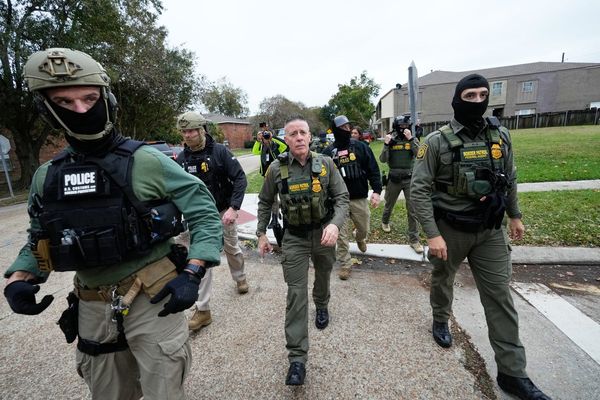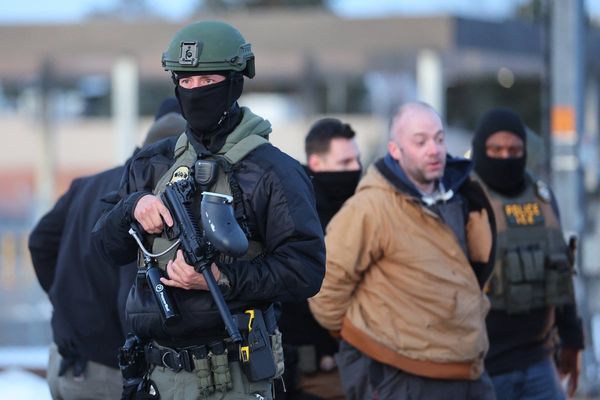ATLANTA — News out of California this summer of a Mexican church leader’s guilty plea for sexually abusing minors had a deep resonance for Erica Ortiz, a metro Atlanta resident since the late 1980s.
Ortiz grew up going to the Marietta outpost of La Luz del Mundo, or “Light of the World,” a Mexico-based megachurch that claims to have more than 5 million followers worldwide. In June, the towering figure at the head of the church, Naasón Joaquín García, became a convicted sex offender, sentenced to 16 years in jail.
García is considered by La Luz del Mundo (LLDM), which has at least half a dozen locations across Georgia, to be an apostle of Jesus Christ. Church critics accuse García of creating a cult of personality around him and describe LLDM as akin to a sect rather than a church.
According to California prosecutors, García leveraged his spiritual authority to coerce girls into sex, telling them it would lead to their salvation. He pleaded guilty to two counts of forcible oral copulation involving minors and one count of a lewd act upon a child who was 15 years old. Still many church members continue to stand with their now-jailed leader, including Ortiz’s mom.
“She says, ‘Well, those are my people. I’m going to stick with my people. If you go against them, you go against me.’ It doesn’t matter (to her) that this man is locked up.”
Their mother-daughter relationship has been severed because of their differing stances on Garcia’s transgressions. And they aren’t alone. In Georgia and across the country, experts say tensions are rising as families come to grips with Garcia’s imprisonment. The fervor on both sides points to the strong sense of community immigrants can derive from religious organizations.
In Ortiz’s case, loyalty to LLDM is especially hurtful because of her own experience with abuse in the context of the church. She says she was twice molested by a fellow church member in her youth, something the local pastor allegedly told the family to keep quiet about. The abuse occurred decades ago. Ortiz has never filed a police report, but said she is taking her story public because she wants to warn others about the church.
“I don’t want anything to do with my mom,” Ortiz said. “She has made her choice.”
The Atlanta Journal-Constitution was unable to reach the leadership of LLDM’s Marietta church for comment. But ongoing local support for García is evident to see.
Near the entrance to the church’s parking lot, a sign depicts García’s portrait alongside the words: “Honorable, innocent (and) irreplaceable.”
The word “honorable” also appears above the church’s front door, with a photo of García.
In a statement released in the immediate aftermath of the sentencing, LLDM defended García, noting the church’s “trust in him remains intact.”
A man who answered the phone at the megachurch’s Valdosta location would not give his name, but echoed that sentiment.
“He is excellent. He is honorable. I know (García) as a friend, as our church leader and our apostle. ... So I can tell you, I know who he is, and I don’t doubt him. The church is with him 100%,” he said in Spanish.
Daniel Ramírez is a Claremont Graduate University associate professor of religion in Claremont, California, and the author of “Migrating Faith: Pentecostalism in the United States and Mexico in the Twentieth Century.”
He says LLDM has built most of its following in the U.S. from the Mexican diaspora. Similar to other Pentecostal groups, LLDM’s appeal is more strongly felt among “campesinos and the proletariat … working class communities.”
To Ramírez, Ortiz’s mother’s reluctance to leave the church is unsurprising. For first-generation immigrants like her, he said congregations are “one of the few spaces of safety” and even sources of empowerment.
“Think of [people] who at nighttime are cleaning offices out of the sight of normal American society and on Sunday get together with others and are given responsibility to serve, to speak, to sing, and to have their lives validated. That is, by and large, the story of immigrant religion in the United States.”
The threshold to turn away from their church community is even higher at LLDM, Ramírez explained, because it is “such a sectarian, narrow group for whom anything outside the church is … evil or insufficient.”
‘This is the man of God’
Abisai Peña, a Marietta native, was born into the LLDM faith. The 28-year-old’s parents married through the church in Mexico, before settling in the Atlanta area. He says his mom had the habit of playing cantos, or church hymns, for him to listen to when she was pregnant.
Following his parent’s example, Peña became a devoted churchgoer in LLDM’s Marietta temple. He was involved in the children’s choir. Later, he volunteered as an interpreter for the church, part of the donations of time and money that are expected from believers. In 2014, Peña went into debt to pay for a trip to Guadalajara, Mexico, where LLDM is based, to witness the official appointment of García as the apostle. Peña remembers falling to his knees and weeping alongside other worshippers when the announcement was made.
“I learned that this man is your everything, this so-called apostle, the leader, he’s your life. If you have anything, it’s because of him,” Peña said. “Whatever he says, goes. You can’t question it. At this church, this cult, there’s a saying: ‘His wishes are our commandments.’ … This is the man of God.”
While LLDM’s Marietta congregation sometimes promotes community service on social media, most posts are dedicated to praising García — including nine posts published in honor of the apostle’s birthday earlier this year.
Criticizing the apostle, or the church, is irredeemable.
“That’s the red line.”
The prospect of social stigma notwithstanding, Peña grew gradually disaffected. He says he was rankled by the church’s insular nature, which discourages members from forming friendships with outsiders. He last stepped foot in temple in the summer of 2019, shortly after García was first arrested by law enforcement in California.
Despite the graphic and emotional testimony of García’s young victims, Peña’s parents continue to support the “apostle,” believing his arrest and jailing to be a conspiracy against an innocent man. To Peña, that stance is “sad,” but he is thankful he has at least been able to maintain a relationship with his family, something he says many former church members, such as Ortiz, have had to sacrifice.
“I have several friends who have left and their parents just don’t speak to them anymore. Their family has just ex-communicated them.”
What Peña calls “the after-effects of leaving a cult” brought on a host of mental health problems, including panic attacks, depression and thoughts of suicide. “My whole life, my whole purpose was around this church. My purpose was around this man,” he said of García.
Ramírez says most sociologists and historians would use the word “sect” to refer to a group like LLDM, rather than the more loaded “cult.”
Peña said he sought therapy and turned to another resource to process his emotions and share his journey: YouTube. His most-viewed video, a Spanish-language testimonial explaining why he left LLDM, has garnered 16,000 views.
Raising awareness
The church garnered attention in Georgia in 2018, when its plans to build a sprawling, 272-acre “City of Light” in Hall County were first made public, sparking backlash from locals. Those construction plans seem to be now on hold, according to reporting from the Gainesville Times. Shelia Cooper, city clerk at Flowery Branch, the town where LLDM wants to build a new compound, says local authorities have yet to receive a rezoning application from the church.
Ortiz says she suspects most of Marietta neighbors driving past LLDM’s Austell Road temple likely don’t know about the church’s association with a convicted sex offender. She wants to change that.
Ortiz says she is reaching out to local businesses and local elected officials to speak to them about LLDM.
“It has to start from somewhere,” she said. “What can we do to keep this organization from running business as usual? It’s about bringing awareness to everybody, putting the facts out there.”
“It was insane growing up in that church,” she said.
———







